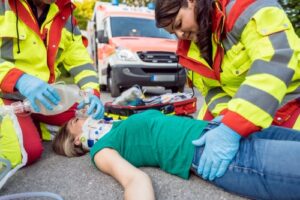
Post-traumatic stress disorder (PTSD) is a serious mental health condition that can be caused by experiencing or witnessing a traumatic event, such as a severe car accident. In fact, car accidents are among the leading causes of PTSD in the general non-military population, and research shows that roughly 9% of car accident survivors develop PTSD.
The emotional and psychological impact of a car crash can be just as debilitating as physical injuries. For those living with PTSD, everyday situations—like hearing a siren or getting behind the wheel—can trigger intense fear, anxiety, or flashbacks that feel as real as the original event.
The American Psychiatric Association (APA) defines post-traumatic stress disorder as “a psychiatric disorder that may occur in people who have experienced or witnessed a traumatic event.”
Individuals who experience a serious motor vehicle accident are at increased risk for psychological problems, particularly Post-traumatic Stress Disorder.
Accident severity, fatalities and severe injuries contribute to the potential for development of PTSD.
 The effects of PTSD after a car accident are different for everyone. Some may have panic attacks when engaging in driving-related activities. Other triggers may relate to the sights, sounds, and smells that occurred at the time of the accident.
The effects of PTSD after a car accident are different for everyone. Some may have panic attacks when engaging in driving-related activities. Other triggers may relate to the sights, sounds, and smells that occurred at the time of the accident.
Common triggers of PTSD symptoms after a car accident might be:
These triggers can lead to panic attacks, emotional shutdowns, or avoidance behaviors that interfere with daily life.

Car accidents are one of the most common single-event traumas that lead to PTSD. Recognizing the symptoms early can help you seek the support you need. Signs may include:
Living with PTSD and other psychological injuries after a car accident can be difficult. Loud noises (at home, work, or in social situations) could result in debilitating fear or panic attacks. Flashbacks and nightmares can plague you, resulting in panic and the feeling that it is happening again. You might be too frightened to drive or ride in a car.
PTSD symptoms may not appear immediately—they can surface weeks or even months after the accident. If left untreated, PTSD can significantly impact your mental health, relationships, and quality of life.
If you or someone you love is struggling with PTSD after a car accident, know that help is available. Understanding your symptoms is the first step toward healing.
Explore these trusted resources:

If you believe your PTSD was caused by a car accident, you may be entitled to compensation for emotional distress, therapy costs, lost wages, and more. At Nash & Franciskato, we understand the complexities of PTSD injury claims, and we are here to help.
If you have questions about a PTSD injury claim, talk to an attorney who can evaluate your claim and explain your legal options. Call Nash & Franciskato at (877) 284-6600. One of our experienced staff members will speak with you personally and will provide you with a free, no-obligation review of your case.
START YOUR FREE CASE REVIEW TODAY
If you would like to receive helpful legal tips, safety insights, and blog updates regularly, sign up to receive our email newsletter. Your email address will only be used to send you our newsletter and respond to inquiries.
Past results afford no guarantee of future results and each case is different and is judged on its own merits. The choice of a lawyer is an important decision and should not be based solely upon advertisements.
Editor’s Note: This post was originally published on November 14, 2023. It was most recently reviewed and updated on October 13, 2025, for content and accuracy, and updated.
Photo Credits: